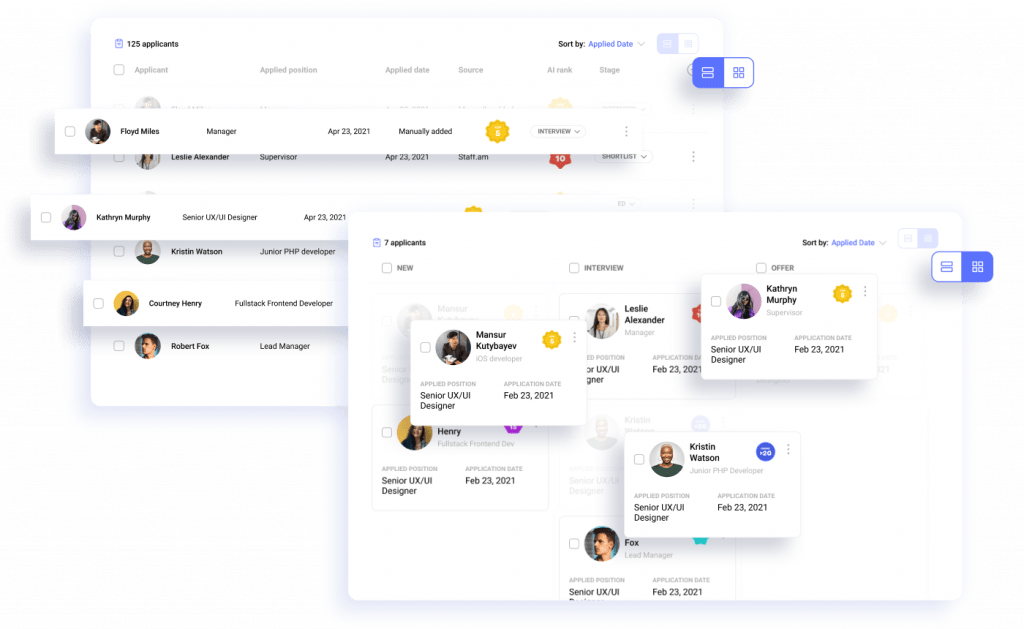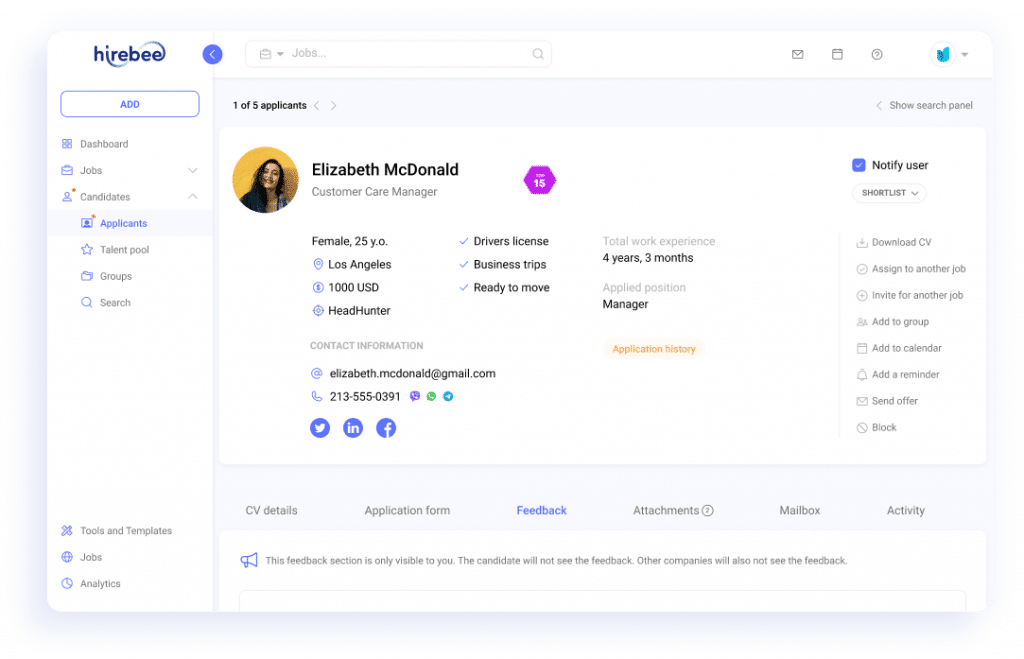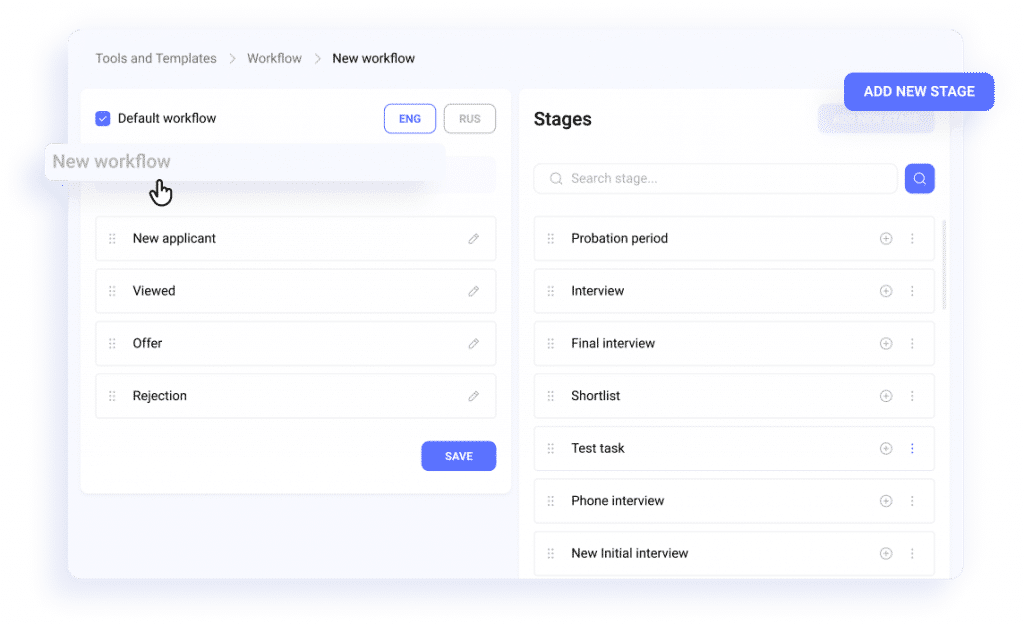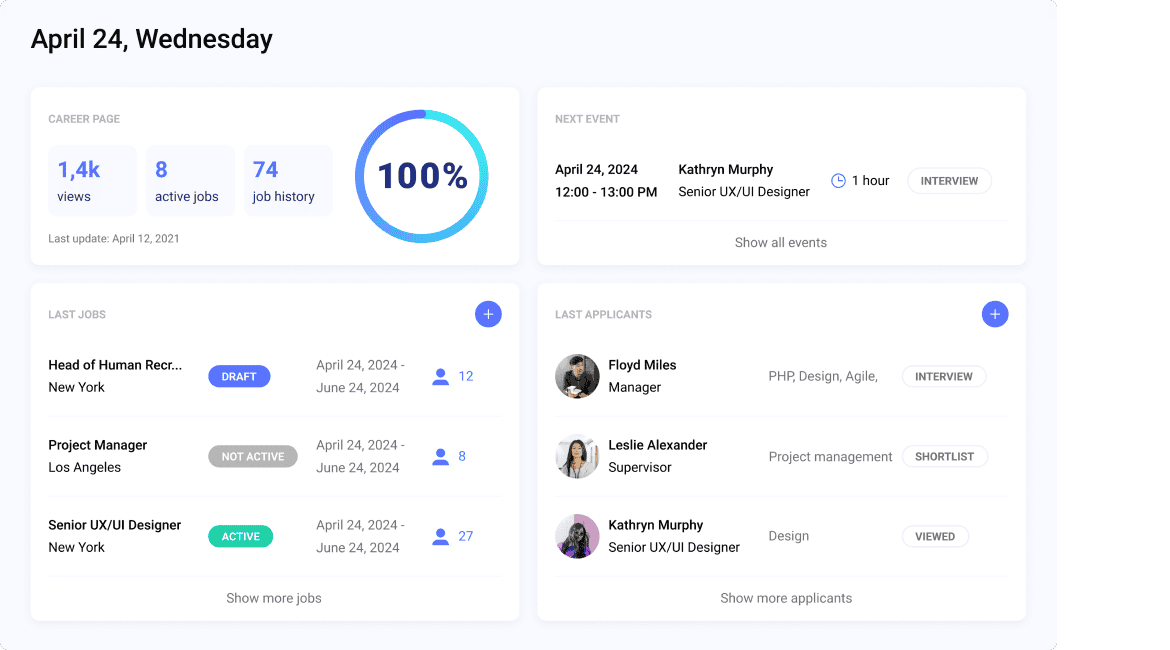Table of Contents
ToggleWhat Is Candidate Relationship Management?
Candidate Relationship Management (CRM) in recruitment refers to the strategic process of building and nurturing relationships with potential job candidates throughout the hiring journey. This includes proactive communication, personalized engagement, and maintaining a positive experience for both active and passive candidates.
CRM is essential not only for enhancing the candidate experience but also for empowering employers with faster hiring cycles, stronger talent pipelines, and improved engagement with top talent. Organizations that invest in CRM are better positioned to attract, retain, and convert high-quality candidates.
A 2023 survey by iHire revealed that 69.5% of job seekers would be less likely to engage with a company if they don’t receive feedback after applying. Whether it’s regular status updates, thoughtful follow-up emails, or a streamlined interview process, it’s evident that candidates value consistent communication—something many employers still fall short on.
Why Candidate Relationship Management Matters in Recruitment
Candidate Relationship Management (CRM) is essential in recruitment as it enhances transparency, builds trust with candidates, and strengthens the employer brand. By fostering clear and consistent communication, CRM ensures that candidates are well-informed throughout the hiring process, reducing uncertainty and promoting a positive experience. This transparency not only benefits candidates but also reflects positively on the organization’s reputation, making it more attractive to top talent.
For recruiters, CRM tools are invaluable in managing large volumes of candidates efficiently. Automation features such as personalized messaging, workflow management, and interview scheduling streamline the recruitment process, allowing recruiters to focus on engaging with the most promising candidates. These tools help maintain a structured and organized approach to candidate management, ensuring that no potential hire is overlooked.
Candidates benefit from timely updates, personalized interactions, and a smoother application journey, leading to higher satisfaction and engagement. From the employer’s perspective, effective CRM practices result in stronger talent pipelines, reduced candidate drop-off rates, and an enhanced employer brand. According to a 2023 article by SHRM, implementing CRM strategies in recruitment significantly improves communication and trust between employers and candidates, ultimately leading to better hiring outcomes.
Improving The Candidate’s Experience
A positive candidate experience directly impacts hiring outcomes and enhances the employer brand. When candidates feel respected and informed throughout the recruitment process, they are more likely to accept job offers, reapply in the future, and recommend the organization to others. Conversely, a negative experience can deter top talent and damage the company’s reputation.
Research indicates that 66% of candidates say a positive experience influenced their decision to accept a job offer, while 26% declined offers due to poor experiences, such as a lack of communication or unclear expectations. Additionally, nearly a third of candidates who withdrew from the recruiting process did so because they accepted another offer, often due to delays or inadequate communication.
Candidate Relationship Management (CRM) tools play a crucial role in enhancing the candidate experience. By automating communications, scheduling interviews efficiently, and providing timely updates, CRM systems ensure that candidates remain engaged and informed throughout the hiring process. This not only improves the overall experience for candidates but also streamlines the recruitment process for employers, leading to stronger talent pipelines and a more favorable employer brand.

Nurturing Talent
Talent nurturing, within the context of Candidate Relationship Management (CRM), refers to the ongoing engagement and communication with candidates who may not be selected immediately but show potential for future opportunities. Rather than viewing unsuccessful applicants as one-time contacts, nurturing focuses on building long-term relationships that can support future hiring needs.
Talent pooling is a key strategy in this approach. It involves maintaining communication with past candidates, those who were qualified but not selected, to create a database of warm prospects for future roles. By staying connected with these individuals, employers can reduce time-to-hire and cost-per-hire when new openings arise, while also preserving the effort invested during the original recruitment process.
CRM tools significantly enhance talent nurturing by enabling regular, targeted engagement. Recruiters can segment candidates based on skills, experience, or interest, and deliver personalized outreach, such as company updates, relevant job alerts, and interview tips, to keep the employer top-of-mind. Automated workflows ensure consistency in communication, while data analytics help identify which candidates are most likely to re-engage. By investing in CRM-driven talent nurturing, organizations build a sustainable talent pipeline, reduce hiring friction, and create a more resilient recruitment strategy.
Strengthening Employer Branding
A well-managed candidate experience plays a crucial role in shaping how your brand is perceived in the job market. Candidates, whether they’re hired or not, walk away from the recruitment process with an impression of your company. When that experience is positive, they’re more likely to leave favorable reviews on platforms like Glassdoor, share their experiences on social media, and recommend your organization to peers.
On the other hand, negative experiences often lead to poor reviews, which can deter top talent from even applying. This effect extends to passive candidates, who may research your reputation before deciding to engage with a recruiter.
CRM tools help protect and strengthen your employer brand by ensuring that every candidate receives timely, respectful, and personalized communication throughout the hiring journey. This builds trust, demonstrates professionalism, and reinforces your company’s values, ultimately turning even rejected candidates into brand advocates.
Reducing Time-to-Hire and Cost-per-Hire
One of the major advantages of using Candidate Relationship Management (CRM) tools is the ability to accelerate hiring timelines and reduce associated costs. By nurturing a pipeline of pre-engaged candidates, recruiters can avoid starting each hiring cycle from scratch.
Automated workflows, interview scheduling tools, and talent segmentation features enable recruiters to act quickly when a new position opens. With a strong CRM system in place, sourcing becomes more about activating warm leads than cold outreach, cutting down both the time-to-hire and the expenses tied to repeated sourcing efforts or prolonged vacancies.
Increasing Offer Acceptance Rates
Consistent and personalized communication throughout the recruitment process builds candidate trust, an essential factor in offer acceptance. When candidates feel informed, valued, and respected, they’re far more likely to say “yes” when a job offer is extended.
CRM tools empower recruiters to maintain this steady communication, from status updates and feedback to interview reminders and company culture insights. These touchpoints help candidates feel connected to the organization before they even start, which increases confidence in the offer and reduces hesitation or second-guessing.
In competitive hiring markets, where candidates may be choosing between multiple offers, a strong CRM strategy can make all the difference.
How Candidate Relationship Management Works
Candidate Relationship Management (CRM) in recruitment is a structured approach to building and maintaining long-term relationships with both active and passive candidates. It spans several key stages: engagement, communication, and nurturing, all supported by recruitment software that helps scale and streamline the process.
At its core, CRM is about proactively managing interactions with candidates at every touchpoint of the hiring funnel. It starts with engaging applicants through well-crafted job descriptions and career pages, continues with clear and timely communication throughout the hiring process, and extends into nurturing talent pools for future opportunities. For example, leveraging hiring software for startups designed specifically for their unique needs can make this process more efficient and scalable from the very beginning.
While some hiring teams attempt to manage this manually, sending individual updates and occasional emails to past applicants, this ad hoc method is often inefficient and unsustainable, especially as hiring needs grow or timelines tighten. Without a structured system in place, candidate communication becomes inconsistent, and opportunities to build strong talent pipelines are lost.
That’s why modern hiring teams turn to recruitment management software to implement CRM effectively. According to G2, 98% of Fortune 500 companies use recruitment software, underscoring its importance in scaling hiring efforts, improving candidate experience, and ensuring data-driven decision-making.
In the sections that follow, we’ll walk through the practical application of CRM using recruitment software, highlighting key features, strategies, and examples that show how to manage applicants efficiently, elevate your candidate experience, and nurture talent for the long term.
Managing Applications with a Candidate Database
A centralized candidate database is the foundation of efficient application management. It streamlines the hiring process by keeping all candidate information organized in one place, eliminating the need to sift through scattered emails, spreadsheets, or documents.
With a candidate database, hiring teams gain quick access to complete candidate profiles, enabling faster reviews, smoother collaboration, and more confident decision-making. It also makes it easy to document feedback, track the recruitment pipeline, and maintain consistent communication across the team.
With our candidate database, you can:
- Systematically review and manage candidates
- Access intuitive, complete candidate profiles
- Collaborate by documenting feedback and sharing notes
- Approve decisions with just a few clicks
- Group, search, filter, and sort candidates for easy comparison
For example, instead of manually reviewing applications in a shared inbox, hiring teams can instantly pull up shortlisted candidates by role or tag, review interview notes, and move them through the funnel in seconds. This saves time and ensures no promising candidate slips through the cracks.

Candidate Profiles
Each candidate in your applicant list is represented by a comprehensive, actionable profile that centralizes all relevant information in one easily accessible location. These profiles are designed to streamline review, communication, and decision-making throughout the hiring process.
A candidate profile includes:
- Application status and hiring stage – View and update a candidate’s current position in the recruitment pipeline directly from their profile.
- Resume highlights – Key details such as work experience and qualifications are summarized at the top for quick reference.
- Contact information – Access phone numbers, email addresses, and social media links for direct communication.
- Source of hire – Track where each candidate came from to optimize your sourcing strategy.
- Team feedback – Collaborate effectively through candidate scorecards and shared evaluations.
- Integrated mailbox – Communicate with candidates directly within the platform, keeping all correspondence in one place.
- Uploaded files – Store and review any supporting materials, such as recorded interviews or additional documents shared by the hiring team.
- Activity log – Monitor every interaction with the profile, ensuring transparency and accountability across the team.
By centralizing all essential data in a single, intuitive interface, candidate profiles empower hiring teams to make faster, more informed decisions and maintain an organized and collaborative workflow at every stage of recruitment.y. Teams hardly need to ever leave the dashboard to gain access to needed information or to conduct their work.

Simplified Search, Filter, and Sort Features
Advanced search, filter, and sorting capabilities significantly enhance the efficiency of your hiring process. Hiring assessment tools allow recruiters to quickly identify candidates who meet specific job requirements, saving time and reducing manual effort.
With just a few clicks, you can:
- Search your candidate database using keywords or tags
- Filter candidates by hiring stage, experience level, or qualifications
- Sort applicants by AI rankings, years of experience, or application date
This level of precision helps streamline shortlisting. For instance, if you’re hiring for a senior marketing role, you can filter applicants with 5+ years of relevant experience and sort them by skill match—instantly narrowing your pool to the most qualified candidates.
By eliminating the need to manually scan every profile, these features speed up decision-making and ensure no time is wasted on unqualified applicants.
Candidate Experience Management
A positive candidate experience is no longer a “nice-to-have” — it is a critical component of successful recruitment and strong employer branding. According to a report by Talent Board, nearly 60% of candidates who have a positive experience are more likely to recommend the employer to others, regardless of whether they were hired. An effective Candidate Relationship Management (CRM) system ensures that every touchpoint a candidate has with your brand is smooth, professional, and engaging.
From the moment they view a job posting to post-interview communication, CRM tools help recruiters build a consistent and thoughtful experience. In this section, we explore how CRM systems elevate candidate experience through custom application forms, automated communication, and streamlined schedulinunprofessional interviews. With an effective CRM process, you are solving at least 2 of those 3 issues.
Custom Application Forms
Creating an effective application process is crucial to attracting and converting top talent. In today’s competitive hiring landscape, a poorly designed or overly complex application form can dramatically reduce your candidate conversion rates. In fact, 92% of candidates abandon online applications before completion, often due to excessive length, technical glitches, or unclear questions.
Custom application forms give recruiters full control over the structure, content, and complexity of the application process. By tailoring forms to specific roles or departments, employers can collect only the most relevant information, reducing friction and improving completion rates. Whether you need different question sets for marketing versus engineering roles or multilingual support for global applicants, customizable forms let you adapt seamlessly to your hiring needs.
Modern Candidate Relationship Management (CRM) systems take this one step further. They enable recruiters to:
- Easily design forms with drag-and-drop builders
- Integrate knockout questions to quickly eliminate unqualified candidates
- Pre-fill candidate details from resumes or LinkedIn profiles to save time
- Automate follow-up messages, confirmation emails, and next steps upon submission
This level of automation and customization not only streamlines the experience for the applicant but also helps internal teams maintain consistency, reduce manual workloads, and move candidates through the hiring funnel faster. The result? A smoother, user-friendly application process that keeps candidates engaged and significantly reduces abandonment.
Automating Communication with Candidates
Effective communication is at the heart of a positive candidate experience. Yet, 75% of applicants report never hearing back from employers after submitting their application. This communication gap not only damages employer branding but also causes top candidates to disengage or drop out of the recruitment process altogether.
The root cause often lies in the lack of proper systems, time constraints, and a deprioritization of candidate outreach, deeply interconnected issues. Manual follow-ups are inefficient, error-prone, and unsustainable at scale.
This is where Candidate Relationship Management (CRM) tools come into play. Advanced CRMs automate candidate communication across every stage of the hiring funnel, enabling consistent, timely, and personalized interactions. With automation, your team can:
- Send acknowledgment emails immediately after applications are received
- Automate status updates as candidates move through different stages
- Trigger follow-up messages based on candidate behavior or timelines
- Maintain brand consistency through pre-set templates and workflows
- Ensure no candidate falls through the cracks, even when hiring in volume
By automating these touchpoints, your hiring team not only saves valuable time but also creates a structured, transparent experience for candidates, keeping them informed and engaged from start to finish.
Automated communication is no longer a luxury; it’s an expectation. With the right CRM in place, employers can meet this expectation effortlessly while strengthening their reputation and improving recruitment outcomes.
Direct Link with Candidates
The first step to making the candidate experience a convenient task is to make contacting candidates a seamless process. A simple yet effective solution that can make communication with candidates that much more convenient is to integrate email into the candidate database.
You might have noticed earlier that we mentioned how each candidate profile had a dedicated mailbox, where you could see email back-and-forths you have had with your candidates. Well, additionally, you can also send emails to candidates, straight from their candidate profiles, and can choose to make email templates for updating candidates on the status of their application.
Automated Emails with Workflows
After making your email templates, you can then automate your communication with candidates by making workflows. Workflows are made up of different hiring stages, with each having its email template designated to it. After creating workflows, you can apply for your job positions, and you’ll have all your applicants for that role moved throughout the hiring process with the logic of the workflow.
Every time you update your applicants’ status, you’ll have the option to immediately send them the email templates assigned to the applicant status. Alternatively, you can also choose to personalize the email by adding a few details. Either way, using workflows and a candidate database with an email integration will greatly increase automation in your candidate relationship management process.

Bulk Emails
Another great way to facilitate communication with candidates is by sending bulk emails. Groups, shortlists, or even filters you have applied for your applicant list can be gathered together for an email you want to send. This can be used for informing passive candidates in your talent pool of a new position open in your company and sending updates and follow-ups to candidates. Instead of going back and forth between copying/pasting email addresses and text, you can quickly select the group of candidates you would like to email and send them a bulk mail.
Interview Scheduling
Interview scheduling is one of the biggest time killers of the recruiting process. Recruiters report that they spend two-thirds of their time on the interview process, with a single interview taking 30 minutes to two hours to schedule. This is a persistent problem in the recruiting industry and one that requires a simple fix. With calendar integrations, employers can fine-tune their interview scheduling process by making candidates “book” a time from the employer’s available time slots. This way, you’ll never find yourself in a game of ping-pong with applicants, going back and forth with times you think would be mutually available.
Find out how you can fine-tune your interview scheduling with Hirebee >> Interview scheduling – Hirebee
Conclusion
In conclusion, candidate relationship management is an important recruiting process that reflects on your candidate experience, employer brand, talent pool, and time-to-hire. While it can be managed manually, it is preferable to leverage recruitment software to make the responsibilities of CRM as convenient as possible. With recruitment software, you will be automating communication with your candidates and leveraging tools that make your everyday recruitment productive.
Try Hirebee for 14 days free to get a glimpse of what you’re missing >> Register for a demo – Hirebee









